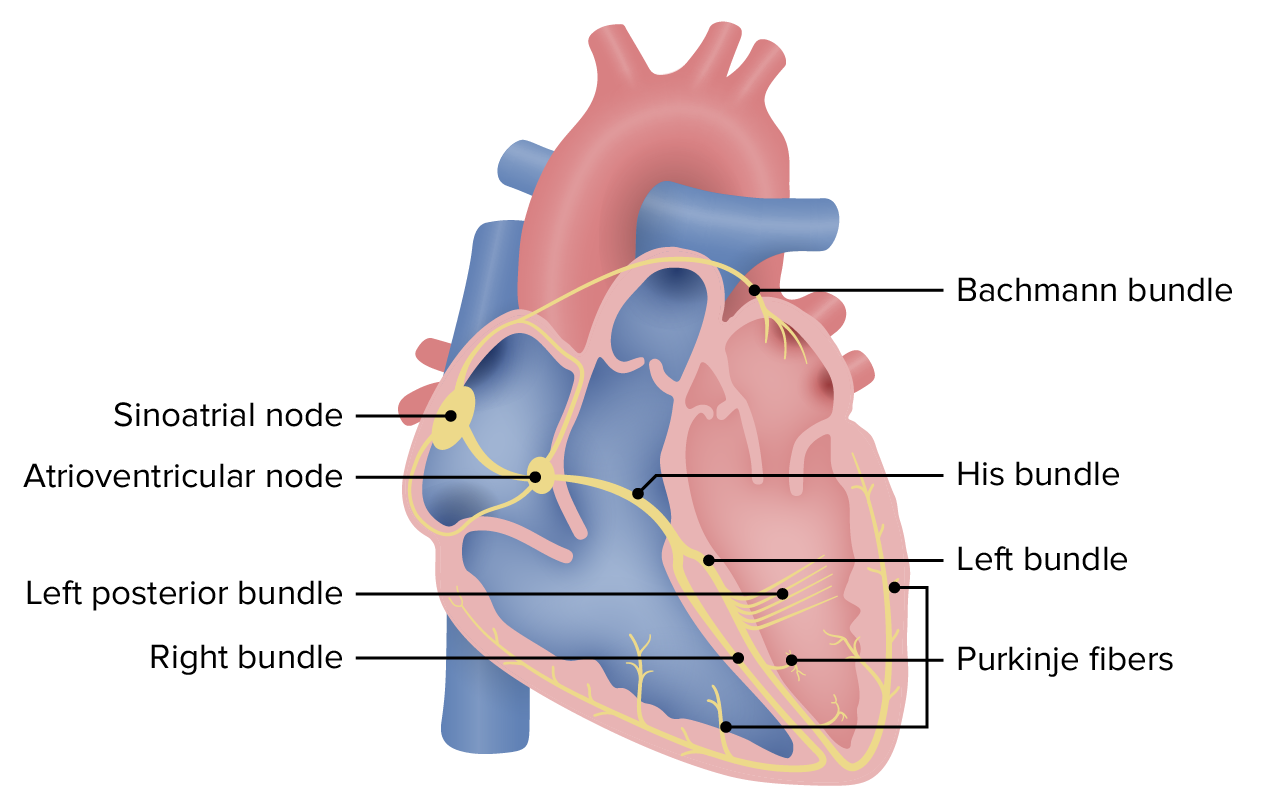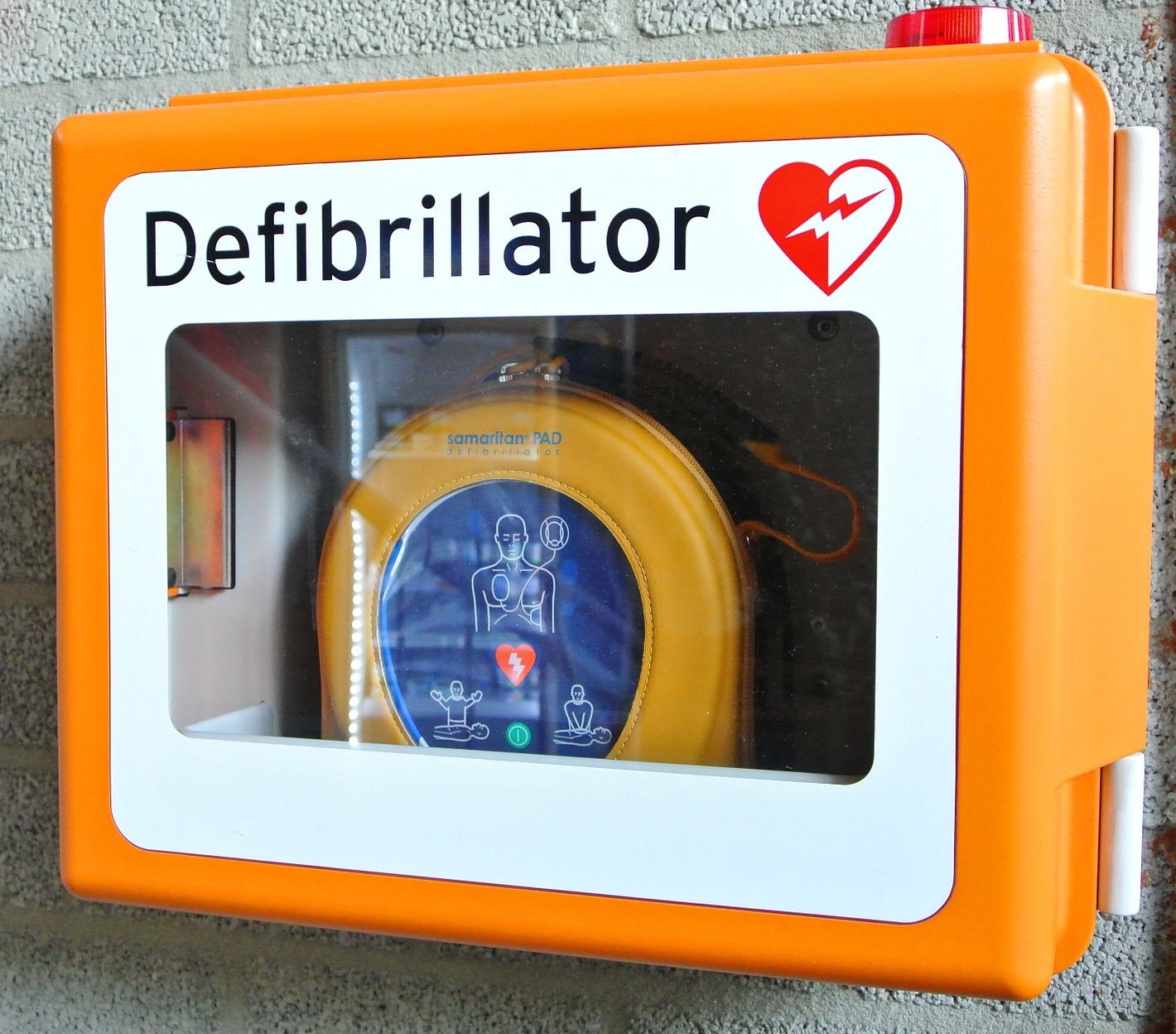Playlist
Show Playlist
Hide Playlist
Sudden Cardiac Death
-
Slides Arrhythmia.pdf
-
Reference List Pathology.pdf
-
Download Lecture Overview
00:02 What is sudden cardiac death, I've used the term recurrently, but I haven't really explained that, so my apologies. 00:07 Sudden cardiac death depends on the definition of where you read it, but it's an unexpected death from a cardiac cause, either without symptoms or within 1 to 24 hours of symptom onset. 00:22 And the EKG that's demonstrated below is one that shows normal p and QRS complex, and then suddenly there's nothing. 00:31 That's to make the point, actually, that the vast majority of sudden cardiac death is due to an arrhythmia and not necessarily due to actual myocardial damage. 00:43 Of causes for sudden cardiac death, 80 to 90 percent are going to be due to coronary artery disease. 00:49 It can also be due to remote injury leading to scarring, which may then lead to arrhythmias And then in the younger patient populations who have a sudden cardiac death, it's usually non atherosclerotic causes as we'll talk about. 01:03 Sudden cardiac death is often the first manifestation of ischemic heart disease, and it can be a manifestation of limiting flow atherosclerosis such as shown here, present in most cases. 01:16 It may be due to remote healed myocardial infarct so that fibrosis will not allow the propagation of cell signaling cell to cell to cell because of that dense area of scarring. 01:28 And in roughly 40% of cases of sudden cardiac death, all we can find is evidence of an old remote infarct. 01:34 Nothing new, but an old remote one with fibrosis that is impeding normal signaling. 01:39 And then we can have in about 10% of cases of sudden cardiac death, there is an acute plaque disruption that is probably causing an acute myocardial infarct, but the patient dies so acutely we don't see the histologic evidence of myocyte necrosis. 01:57 We don't see the actual infarct because the cells die and the patient dies before we have a chance to have the histologic changes. 02:09 Hereditary or acquired abnormalities of the cardiac conduction system can have non-atherosclerotic causes. 02:18 Congenital coronary artery abnormalities. 02:21 So this is not really atherosclerosis, but this may be a coronary artery that courses in the wrong place and is prone to being compressed by other extrinsic structures. 02:32 Mitral valve prolapse probably by causing relative ischemia, the papillary muscle that's associated with that prolapse in valve can also be a cause for sudden cardiac death. 02:43 Sarcoidosis because of the inflammation and the focal scarring within the myocardium can be another non-atherosclerotic cause of sudden cardiac death. 02:54 Myocarditis with inflammation and focal cellular damage and necrosis can be a cause of arrhythmias. 03:01 And dilated or hypertrophic cardiomyopathies where we're getting individual cardiac myocytes that are big with a relative area of central ischemia because we don't increase the capillary density, are also prone to having sudden development of arrhythmias. 03:19 Myocardial hypertrophy is an otherwise independent risk factor for sudden cardiac death. 03:24 And again, as the individual cardiac myocytes enlarge, as a response to systemic hypertension as a response to aortic stenosis, those individual cardiac myocytes get bigger and bigger and bigger. 03:38 The capillary density around them doesn't change, so the diffusion distance for oxygen and nutrition is increased with the expanding size of the individual cardiac myocytes. 03:48 And as a result of that, we have an area of relative ischemia, hypoxia in the middle of those cells. 03:54 Now, since we're having to conduct currents of calcium and sodium and potassium throughout the cell, dysfunctional ATP in a local area of the cell may make it prone to aberrant signaling and therefore becoming a nidus for arrhythmia. 04:13 In young individuals, myocardial hypertrophy, typically in the setting of hypertrophic cardiomyopathy, is a common cause of sudden cardiac death in youth. 04:23 And when we have an athlete, otherwise healthy and viable athlete die tragically at a young age, it's often in association with myocardial hypertrophy and actually frequently in association with hypertrophic cardiomyopathy. 04:40 Other non-atherosclerotic causes of sudden cardiac death, and these are not even arrhythmias, these are just other causes that you should be aware of. 04:47 So a pericardial tamponade and accumulation of fluid acutely around the heart will prevent the heart from being able to expand during diastole, it won't fill. 04:57 It will contract fine, but won't fill, and that can be an acute cause of sudden cardiac death. 05:03 Non-atherosclerotic in general. 05:06 Pulmonary embolism, another cause. 05:08 So if I have a big pulmonary embolus and I am not able to get blood from the right side of the body to the left side of the body, and I'm not getting oxygenated blood to the left side of the body, you will have a sudden death. 05:22 Other systemic, metabolic and hemodynamic alterations can do this. 05:27 Patients who have a severe renal insufficiency can develop such severe metabolic acidosis or hyperkalemia or hypercalcemia that they then have a non atherosclerotic sudden cardiac death. 05:45 Vasospasm. 05:46 There's no atherosclerosis, but the vessel may spasm and cause ischemia and can cause arrhythmias. 05:51 And vasospasm can occur in the setting of catecholamines. 05:54 So say, from a pheochromocytoma or from cocaine, things that can cause small vessel vasospasm. 06:04 Drugs such as cocaine and methamphetamines should be considered in the evaluation of patients who have a sudden death without evidence of significant atherosclerotic disease or other defects in the normal structure and organization of the heart. 06:22 So lethal arrhythmias, the most common mechanism of sudden cardiac death. 06:28 So ventricular fibrillation, clearly, I'm not squeezing blood out of the ventricles sufficiently to perfuse the brain or any other structure, within two to three minutes, the patient will die. 06:38 And if there is asystole, clearly the patient is going to die. 06:43 There may not be any obvious infarction in the heart. 06:46 There may be no, nothing that we can identify structurally and yet lethal arrhythmia makes the patient just as dead. 06:55 This is just to make that point, infarction need not occur for sudden cardiac death to occur. 07:02 And in fact, most cases the vast majority of cases, 90% of cases, a fatal arrhythmia is triggered by electrical instability or irritability of the myocardium and not by infarction. 07:15 How can we treat this? Well if we know that a patient is prone to sudden cardiac death by whatever testing, family history, long QT, short QT, etcetera, we can do pharmaceutical intervention to try to regularize the heartbeat and minimize the arrhythmias. 07:31 We can also put implantable cardioverter defibrillators, ICDs. 07:36 These detect arrhythmias, everything from asystole all the way up to ventricular fibrillation, atrial fibrillation, et cetera depending on how they're programed, they will fire and restart the heart. 07:49 And those are the dominant ways by which we treat this. 07:54 With that, we've covered a lot of territory having to do with whether a heartbeat is regular or not.
About the Lecture
The lecture Sudden Cardiac Death by Richard Mitchell, MD, PhD is from the course Arrhythmia.
Included Quiz Questions
Which of the following is an atherosclerotic cause of sudden cardiac death?
- Acute plaque disruption
- Myocarditis
- Sarcoidosis
- Mitral valve prolapse
- Congenital coronary anomaly
Which of the following may cause sudden cardiac death due to coronary vasospasm?
- Pheochromocytoma
- Pericardial tamponade
- Pulmonary embolism
- Electrolyte disturbance
- Cardiac fibrosis
Which of the following drugs is associated with nonatherosclerotic sudden cardiac death?
- Methamphetamine
- Lysergic acid diethylamide
- Caffeine
- Cannabinoids
- Nicotine
Customer reviews
5,0 of 5 stars
| 5 Stars |
|
1 |
| 4 Stars |
|
0 |
| 3 Stars |
|
0 |
| 2 Stars |
|
0 |
| 1 Star |
|
0 |
Very well explained with all key aspects covered. Spilt into useful categories.





